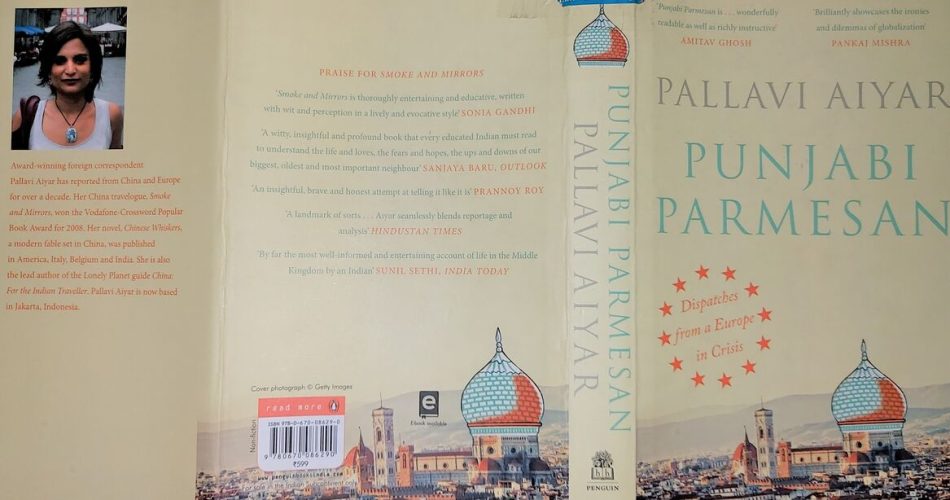Pallavi Aiyar is an award-winning foreign correspondent. Earlier this century she had lived in China for nearly a decade and wrote a wonderful book about the rise of China titled “Smokes and Mirrors” which I thoroughly enjoyed reading. Then she moved with her family to Brussels and lived there for the next four to five years. After Belgium, she lived in Jakarta (Indonesia) for a few years and then in Japan. You cannot find a better author to analyse and provide a candid perspective of a country than Pallavi Aiyar. With her own experience of living in Belgium, the interviews she had conducted, and her role as an UN-accredited journalist, she has written a book on Europe. Titled “Punjabi Parmesan: Despatches From A Europe In Crisis” it was published in 2013, reading the book made me question what I had seen when I visited the continent and thought of Europe. I liked the book and below are my notes from reading the book.
After her husband Julio, a Spaniard, passes a series of examinations to qualify as a European Commission Official, the couple along with their newborn Ishaan and two Chinese cats move to Brussels from Beijing. She imagines “It would be a move from the contradictions and messiness of a giant country hauling its toiling millions out of poverty to a settled, prosperous land of manicured parks and handsome fin de siècle homes”. Was it so?
As the book progresses, Pallavi peels away the layers of shiny wrappers that surround an Indian’s (or Asian in general) imagination of Europe. I had grown at a time (the 1970s and 1980s) when the continent was recalled in popular conversations for its brilliant engineering or administration capabilities. I have been to the United Kingdom a couple of times and to Germany once, the trips reinforced the image of the continent aspiring to be an ideal human society. Punjabi Parmesan makes me question what I had seen and thought of Europe.
As Pallavi and her family land in Brussels, things start to go bad. She shares her anxiety and feeling of being treated second-class as she waits with a blue passport (Indian) in hand in the queue at immigration in Brussels while her husband and baby boy breeze through the process with their maroon (Spain) passports. This reminded me of one of the many incidents I have had with applying for a VISA or the experiences I have faced at the immigration counters in a foreign airport. After they clear the immigration, at the baggage counter she gets tricked to have her hand baggage with the laptop getting stolen, it was followed by their ordeal at a local police station in Belgium.
Modern Belgium comprises Dutch-speaking Flanders and French-speaking Wallonia. Around 2013, when this book was written a quarter (250,000 in number) of the residents of Brussels the capital of Belgium are immigrants from Muslim countries, primarily Morocco and Turkey. In many schools in certain municipalities, over 90 per cent of the students are Muslim.
The author writes about her visit and her interviews in Antwerp near Brussels, which is known as the diamond capital of the world for several centuries. Once dominated by Jews, today the Gujaratis from India have overtaken them. An unbelievable success story here. Her travels in the continent take her to Germany, Italy and other places.
Pallavi Aiyar then moves on to cover the Euro crisis because of economic problems in Greece. She shares her experience of being pregnant with her second son in Belgium, which felt very different to her experience of being pregnant with her first son in China.
She explains the similarities and differences she sees in a multicultural, multi-language society like in Europe to the one in India. The book ends with her take on what she sees as the future for Europe, its promises and difficulties.
Overall a must-read for any Indian who wants to understand Europe.



Comments